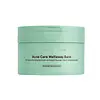What's inside
What's inside
 Key Ingredients
Key Ingredients

 Benefits
Benefits

 Concerns
Concerns

 Ingredients Side-by-side
Ingredients Side-by-side

Ethylhexyl Palmitate
EmollientTridecyl Isononanoate
EmollientCetyl Ethylhexanoate
EmollientPEG-12 Diisostearate
EmulsifyingPEG-20 Glyceryl Triisostearate
EmollientSynthetic Wax
AbrasiveHydrogenated Vegetable Oil
EmollientPrunus Amygdalus Dulcis Oil
Skin ConditioningCandelilla Wax Esters
Phenoxyethanol
PreservativeCitrus Tangerina Peel Oil
MaskingTocopheryl Acetate
AntioxidantAllantoin
Skin ConditioningWater
Skin ConditioningButylene Glycol
HumectantVitis Vinifera Seed Oil
EmollientCaprylyl Glycol
EmollientChamomilla Recutita Extract
Skin ConditioningChaenomeles Sinensis Fruit Extract
AntioxidantGlycyrrhiza Glabra Root Extract
BleachingCopernicia Cerifera Wax
Scutellaria Baicalensis Root Extract
AstringentSophora Angustifolia Root Extract
Skin ConditioningGlycyrrhiza Inflata Root Extract
Skin ConditioningCalendula Officinalis Extract
Skin ConditioningEthylhexyl Palmitate, Tridecyl Isononanoate, Cetyl Ethylhexanoate, PEG-12 Diisostearate, PEG-20 Glyceryl Triisostearate, Synthetic Wax, Hydrogenated Vegetable Oil, Prunus Amygdalus Dulcis Oil, Candelilla Wax Esters, Phenoxyethanol, Citrus Tangerina Peel Oil, Tocopheryl Acetate, Allantoin, Water, Butylene Glycol, Vitis Vinifera Seed Oil, Caprylyl Glycol, Chamomilla Recutita Extract, Chaenomeles Sinensis Fruit Extract, Glycyrrhiza Glabra Root Extract, Copernicia Cerifera Wax, Scutellaria Baicalensis Root Extract, Sophora Angustifolia Root Extract, Glycyrrhiza Inflata Root Extract, Calendula Officinalis Extract
Ethylhexyl Palmitate
EmollientCaprylic/Capric Triglyceride
MaskingPEG-20 Glyceryl Triisostearate
EmollientCetyl Ethylhexanoate
EmollientPEG-12 Diisostearate
EmulsifyingPolyethylene
AbrasivePhenoxyethanol
PreservativeWater
Skin ConditioningCaprylyl Glycol
EmollientGlucosylrutin
AntioxidantCharcoal Extract
Skin ConditioningLactic Acid
BufferingMandelic Acid
AntimicrobialMalic Acid
BufferingLactobionic Acid
BufferingGlycolic Acid
BufferingCapryloyl Salicylic Acid
ExfoliatingSalicylic Acid
MaskingParfum
MaskingTocopherol
AntioxidantCentella Asiatica Extract
CleansingSalix Alba Bark Extract
AstringentBixa Orellana Seed Extract
MaskingSodium Hyaluronate
HumectantEthylhexyl Palmitate, Caprylic/Capric Triglyceride, PEG-20 Glyceryl Triisostearate, Cetyl Ethylhexanoate, PEG-12 Diisostearate, Polyethylene, Phenoxyethanol, Water, Caprylyl Glycol, Glucosylrutin, Charcoal Extract, Lactic Acid, Mandelic Acid, Malic Acid, Lactobionic Acid, Glycolic Acid, Capryloyl Salicylic Acid, Salicylic Acid, Parfum, Tocopherol, Centella Asiatica Extract, Salix Alba Bark Extract, Bixa Orellana Seed Extract, Sodium Hyaluronate
Ingredients Explained
These ingredients are found in both products.
Ingredients higher up in an ingredient list are typically present in a larger amount.
Caprylyl Glycol is a humectant and emollient, meaning it attracts and preserves moisture.
It is a common ingredient in many products, especially those designed to hydrate skin. The primary benefits are retaining moisture, skin softening, and promoting a healthy skin barrier.
Though Caprylyl Glycol is an alcohol derived from fatty acids, it is not the kind that can dry out skin.
This ingredient is also used as a preservative to extend the life of products. It has slight antimicrobial properties.
Learn more about Caprylyl GlycolCetyl Ethylhexanoate is an emollient ester. It comes from cetearyl alcohol and 2-ethylhexanoic acid.
Cetyl Ethylhexanoate is an emollient that adds a velvety feel to skin without being greasy or oily. Emollients help trap moisture into your skin, keeping your skin soft and hydrated.
Ethylhexyl Palmitate, also known as octyl palmitate, is created from 2-ethylhexyl alcohol and palmitic acid. It is a fatty acid ester.
The fatty acid content of Ethylhexyl Palmitate makes it an emollient. Emollients help soften and hydrate your skin by trapping moisture within.
Ethylhexyl Palmitate is also used to help improve the texture of cosmetics. It helps other ingredient dissolve in products and help disperse ingredients more evenly.
You'll likely find this ingredient in sunscreen, as it is often used to mix UV-blocking ingredients such as avobenzone and ethylhexyl triazone.
It can also help stabilize the fragrances in a product as a fragrance fixative.
Ethylhexyl Palmitate can be used to substitute mineral oil.
Due to its high fatty acid content, it may not be fungal-acne safe.
Learn more about Ethylhexyl PalmitatePEG-12 Diisostearate isn't fungal acne safe.
Peg-20 Glyceryl Triisostearate comes from Isostearic Acid and glycerin.
It is an emollient, emulsifier, and gentle cleanser. As an emollient, it helps trap moisture to keep skin soft and hydrated. Emulsifiers help prevent ingredients from separating.
This ingredient is common in oil-based products. This is because it helps oil-ingredients be easily washed away without leaving a residue.
Peg-20 Glyceryl Triisostearate may not be fungal-acne safe.
Learn more about PEG-20 Glyceryl TriisostearatePhenoxyethanol is a preservative that has germicide, antimicrobial, and aromatic properties. Studies show that phenoxyethanol can prevent microbial growth. By itself, it has a scent that is similar to that of a rose.
It's often used in formulations along with Caprylyl Glycol to preserve the shelf life of products.
Water. It's the most common cosmetic ingredient of all. You'll usually see it at the top of ingredient lists, meaning that it makes up the largest part of the product.
So why is it so popular? Water most often acts as a solvent - this means that it helps dissolve other ingredients into the formulation.
You'll also recognize water as that liquid we all need to stay alive. If you see this, drink a glass of water. Stay hydrated!
Learn more about Water